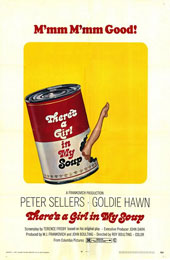Critical response
Variety found the film "a delightful surprise: a rather simple legit sex comedy (by Terence Frisby) transformed into breezy and extremely tasteful screen fun." [21]
Roger Greenspun in The New York Times , dismissed the film as "without illumination or wit or good humor or good sense", and concluded "The only performance to praise is that of Tony Britton, who, as Danvers's very much married publisher and friend, achieves a level of sophisticated pleasantness that actually, suggests comedy. Peter Sellers, on the other hand, is at his least inventive. And Goldie Hawn, who I think might be fun in another part, mostly indulges in bad habits with her too-expressive eyes. In fairness, both Miss Hawn and Mr. Sellers are handicapped by roles in which any attempt at a characterization must seem an imposition." [22]
Gene Siskel of the Chicago Tribune gave the film 1.5 stars out of 4 and wrote that Sellers had "his first decent role in several years" and gave a "completely sympathetic performance", but "no amount of humor is able to wake up the film's tired story premise." [23]
Kevin Thomas of the Los Angeles Times was positive, writing "Escapist entertainment it assuredly is, yet Frisby has wisely provided enough quiet moments between his gags to allow his characters to become real enough to care about." [24]
Tom Milne of The Monthly Film Bulletin stated that Sellers was "hopelessly miscast" and that the film "would have been much better served by a straight romantic lead." [25]
The website Allmovie comments that "Soup was different in its day, as the heroine of the piece was not a Doris Day-type eternal virgin, but a sexual being who not only gives herself freely to a man but is upfront and unapologetic about her willingness. The movie has little going for it beyond this premise, and it wanders rather aimlessly, if agreeably, before abruptly resolving its insignificant conflicts." [26]
The Radio Times Guide to Films gave the film 2/5 stars, writing: "This is a very tame version of a sex comedy that ran and ran on both sides of the Atlantic. Roy Boulting directs without much enthusiasm for his tale of womanising TV celebrity Peter Sellers, who is knocked off his stride by a chance encounter with dippy waif Goldie Hawn. Content to cruise through his meagre helping of wisecracks, the miscast Sellers still teams well with Hawn, who also has some funny scenes with ditched boyfriend Nicky Henson." [27]
